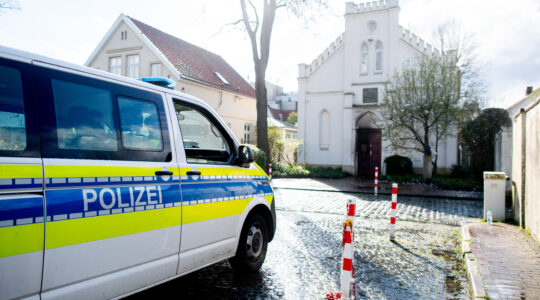KIEV, Ukraine (JTA) – While Ukraine’s government has promised to keep the gravesite of Rabbi Nahman of Bratslav accessible to Jewish pilgrims, the property dispute there has imperiled Jewish control over the country’s most-visited Jewish heritage site.
Now even local Jewish leaders agree that the Bratslav group that oversees the site in Uman, a town of 100,000 some 120 miles south of Kiev, would be better off resolving its outstanding financial obligations to the construction company that threatened to shut down the site.
Chance, the company hired a few years ago by the Rabbi Nahman Foundation to expand facilities at the site in Uman, took the foundation to court over an unpaid debt. The company threatened to take control of the property, triggering fears that the Uman site would become inaccessible to the tens of thousands of Chasidim who visit every year.
Last month the Ukrainian government stepped in, with the Foreign Ministry stating that the grave of the founder of Bratslav Chasidism is a national heritage site and cannot become private property or be used as collateral in any property dispute. The statement followed a meeting between Bratslav leaders and Ukrainian President Viktor Yuschenko, who visited Israel in mid-November.
“The synagogue and the gravesite of Rabbi Nahman of Bratslav in Uman are holy cultural and religious assets and belong to the Jewish people,” Yuschenko said. “Like in every enlightened country, in Ukraine holy religious sites are not up for negotiations.”
At the crux of the dispute, which has generated extensive media coverage here, is a substantial sum of money Chance says it is owed by the Rabbi Nahman Foundation.
The foundation disputes the size of the debt, even that it owes Chance anything, since the foundation says the company has not fulfilled its contractual obligations.
Several courts rulings in the past two years have found in favor of Chance, which is owned by Petro Kuzmenko, a member of Ukraine’s parliament. Kuzmenko declined to respond to JTA for a request for comment.
Most recently, on Oct. 4, the High Economic Court of Appeals in Kiev upheld earlier court decisions and ruled that the Rabbi Nahman Foundation should pay its debt to Chance. After that decision, the Bratslav group appealed directly to Ukraine’s president.
The appeal prompted the government to make clear that it holds ultimate control over the national heritage site and that the Jewish group that oversees the site is merely “using it,” said Svetlana Lipinskaya, an adviser to Uman’s mayor.
Ukrainian Jewish leaders interviewed for this story say the Bratslav group should not have taken up the issue with Yuschenko when the problem is no more than a business dispute – with the Jews at fault.
Chance “won in all courts, and I doubt how Yuschenko can influence the solution of the issue,” said Igor Kuperberg, head of the Magen League in Ukraine, a Jewish anti-missionary group. “Now the foundation should execute the court decision and pay the debt.”
“All financial issues should be resolved in court,” agreed Arkady Monastyrsky, chief executive of the Jewish Foundation in Ukraine, a Kiev-based cultural group and charity.
Representatives of the Nahman foundation did not return calls from JTA seeking comment.
Each Rosh Hashanah, tens of thousands of Bratslav Chasidim from all over the world converge on Uman to pray at the grave of their movement’s founder. This year, an estimated 20,000 Jews from 20 countries made the pilgrimage.
The town’s synagogue, which was built recently by the movement to accommodate pilgrims, can hold up to 5,000 worshipers and is believed to be the largest in Europe.
More than four years ago, the Nahman foundation contracted Chance to expand the synagogue’s capacit. For the past two years, the foundation and the company have been bogged down in the current dispute.
The contract reportedly contained a clause that put 30 percent of the value of the finished synagogue, or $2 million, as collateral if the foundation did not pay the contractor on time and in full.
Chance representatives said they were paid only $100,000 for the job; the Bratslav group said the work was not completed on schedule nor fully finished.
The value of the foundation’s property has been reassessed by Ukraine’s Ministry of Justice at $1.6 million, meaning the foundation owes $1.5 million, not $1.9 million, to Chance.
“The only right solution [for the Bratslavers] is to come to an agreement with the Chance company and to execute the court decision,” said Lipinskaya of the Uman mayor’s office.
Bratslav leaders have said they want the lawsuit to be dropped altogether, blaming a flawed contract between their foundation and Chance. The foundation says it still needs to expand the synagogue to meet the space requirements of its growing number of pilgrims.
Rabbi Moshe Reuven Azman, Kiev’s chief rabbi, told JTA the dispute could be resolved by outsiders.
“There are people who are willing to help and to settle the dispute,” Azman said, referring to some Jewish businessmen he suggested are willing to pay the Bratslavers’ debt.





